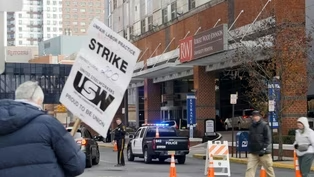NJ Spotlight News
Human rights expert: Israel must ‘abide by humanitarian law’
Clip: 12/4/2023 | 6m 56sVideo has Closed Captions
IDF attacking the southern part of the Gaza Strip, as Palestinians move south
Israel is expanding its military ground invasion of Gaza, with forces now attacking the southern part of the strip around the densely populated city Khan Younis. NJ Spotlight News anchor Briana Vannozzi spoke with Kenneth Roth, who served for nearly three decades as the executive director of Human Rights Watch and is a visiting professor at Princeton University.
Problems playing video? | Closed Captioning Feedback
Problems playing video? | Closed Captioning Feedback
NJ Spotlight News is a local public television program presented by THIRTEEN PBS
NJ Spotlight News
Human rights expert: Israel must ‘abide by humanitarian law’
Clip: 12/4/2023 | 6m 56sVideo has Closed Captions
Israel is expanding its military ground invasion of Gaza, with forces now attacking the southern part of the strip around the densely populated city Khan Younis. NJ Spotlight News anchor Briana Vannozzi spoke with Kenneth Roth, who served for nearly three decades as the executive director of Human Rights Watch and is a visiting professor at Princeton University.
Problems playing video? | Closed Captioning Feedback
How to Watch NJ Spotlight News
NJ Spotlight News is available to stream on pbs.org and the free PBS App, available on iPhone, Apple TV, Android TV, Android smartphones, Amazon Fire TV, Amazon Fire Tablet, Roku, Samsung Smart TV, and Vizio.
Providing Support for PBS.org
Learn Moreabout PBS online sponsorshipIsrael is expanding its military ground operation against Hamas in Gaza, with forces now hitting the southern part of the strip around the densely populated city.
Khan Younis, an area that was already home to far more Palestinian refugees than it has capacity for.
A spokesperson for the IDF, the Israeli Defense Forces, on Sunday confirmed they're now targeting all of Gaza, saying a weekend airstrike killed a Hamas commander who was responsible for carrying out the October 7th terrorist attack on Israelis, adding the military is determined to eliminate Hamas around the world, even if it takes years.
But the focus on southern Gaza is intensifying the humanitarian crisis for Palestinians.
The UN says more than 80% of Gaza's total population, about 1.9 million people, have been displaced since the start of the war.
Many were told to evacuate from the north to the south, which is now under bombardment, with new evacuation orders issued this Sunday and no place left for Palestinian refugees to go.
For more on the crisis, I'm joined by Kenneth Roth.
He served for nearly three decades as the executive director of Human Rights Watch and is a visiting professor at Princeton University.
Ken Roth, thanks so much for joining me.
This latest round of fighting has now put Palestinians in an even more dire situation because, quite frankly, they're running out of places to go.
What type of choices are they having to make right now when they're being asked to evacuate again?
Completely impossible choices.
I mean, Israel has sent around this very detailed map of southern Gaza.
But, of course, many Palestinian civilians there don't even have access to electricity.
To download the map.
And Israel stopped saying, oh, you can move here because it's safe.
They've now just started saying moves there because it's safe.
Erm but they're not, you know, guaranteeing any place won't be bombed.
They said you know, they're attacking all of Gaza now.
And so the civilians don't know what to do.
Do they stay where they are and risk getting bombed or do they go someplace else and risk getting bombed.
And of course all of this is in the context of extremely limited access to basic food, water, electricity, you know, the necessities of life.
The hospitals have been severely curtailed.
And so it is a horrible situation for Palestinian civilians.
I'm also thinking about the fact that a lot of these individuals and families have already moved once or twice, evacuated once or twice.
As you said, aid is limited.
And so how do they go about bringing with them what they need when they've already left a home or a place of refuge?
I mean, they can't.
But that's the basic thing.
And I think we do have to at this point say, you know, Israel is required to abide by humanitarian law.
That is to say, you know, the basic rules that war crimes by one side don't justify war crimes by the other.
So, you know what Hamas did on October 7th, The horrible slaughter and abduction of civilians does not justify Israel.
You know, either bombing civilian targets as an Israeli media outlet recently showed where they're trying to get Palestinian civilians to pressure from us, you know, which could be a death sentence.
That's a war crime, the indiscriminate bombing of whole neighborhoods rather than specifically targeting military targets.
That's a war crime.
And most commonly, we're seeing that even when there is a military target, Israel's been firing in a way that causes disproportionate harm to civilians.
You know, for example, dropping 2,000 pound bombs in the middle of a refugee center, a refugee, you know, village.
And that's, you know, something the U.S. would never do.
The U.S. doesn't use 2000 1,000 pound bombs in populated areas.
It's very reluctant to use 500 pound bombs.
You know, that's why we're seeing Biden saying, you know, you've got to pay more attention to civilian casualties now.
The U.S. government has not said, you know, and you're violating these rules in the past.
But that's the subtext.
That's, you know, the message that comes through over and over from the statements from the U.S. government.
Well, and so where does it go from here?
This is already considered to be the deadliest attack on Palestinians since 1948.
Where does it go from here?
Well, you know, it depends who you ask.
I mean, the extremists in the Netanyahu government, you know, clearly would like to just drive 2.2 million Palestinian civilians into Egypt.
You know, a second so-called Nakba, a reference to the catastrophe of 1948 when some 700,000 people were displaced.
Then the Biden administration says, you know, we want no territorial grab, no forced displacement.
It has the leverage to insist on that.
I mean, the $3.8 billion in U.S. military aid, the massive sale of arms, the proposed $14 billion military aid package.
That's leverage.
It's really up to the Biden administration now to use that leverage to press for an immediate end to this horror for Palestinian civilians.
May I just very quickly, I would love to get your take because you brought this up.
There was an investigation by 972 magazine looking into the way Israel identifies its targets to bomb.
And you alluded to that in terms of civilian casualties.
In your experience, 30 years at Human Rights Watch, and I'm not asking you to speculate as to whether the Israeli military specifically knows what the civilian count will be in terms of casualties.
But is this type of expansion in the way these military offenses can be carried out just leading to mass casualties among civilians?
Well, what you're referring to, the Israeli independent media outlet 972 had this stunning revelation, which is that the Israeli military is deliberately targeting what they call power centers.
But what they really meant is, you know, significant prestige civilian institutions, not legitimate military targets, but civilian institutions as a way to force Palestine and civilians to put pressure on Hamas to surrender.
And so they gave examples something we've seen even in prior wars, where they would go after, you know, some big prestigious apartment building.
No real military reason for doing that.
Suddenly they render 100 families homeless.
And the idea is just to show Palestinian civilians you're going to suffer the consequences.
Put pressure on Hamas to stop it.
Of course.
How do Palestinian civilians pressure Hamas?
This is a military dictatorship.
You get shot at, you start protesting.
So this is a cruel war crimes strategy that the Israeli government is pursuing and is obviously adding to the civilian casualty count.
Ken Roth is the former executive director of Human Rights Watch and is a visiting professor at Princeton University.
Ken, thanks so much.
Thank you.
COVID-19 cases rise as holiday season nears
Video has Closed Captions
Clip: 12/4/2023 | 4m 12s | Epidemiologist Stephanie Silvera explains how you can stay safe (4m 12s)
NJ congressmen: Chinese seafood tied to forced labor
Video has Closed Captions
Clip: 12/4/2023 | 4m 17s | New reporting reveals human rights violations, overfishing (4m 17s)
RWJ nurses come to tentative agreement, legislation in works
Video has Closed Captions
Clip: 12/4/2023 | 4m 25s | Union leadership called it, in a statement, a historic agreement (4m 25s)
Should NJ ban pet-shop puppy sales?
Video has Closed Captions
Clip: 12/4/2023 | 4m 9s | Senate Economic Growth Committee hears testimony on animal rights bills (4m 9s)
Providing Support for PBS.org
Learn Moreabout PBS online sponsorship
- News and Public Affairs

Top journalists deliver compelling original analysis of the hour's headlines.

- News and Public Affairs

FRONTLINE is investigative journalism that questions, explains and changes our world.












Support for PBS provided by:
NJ Spotlight News is a local public television program presented by THIRTEEN PBS



